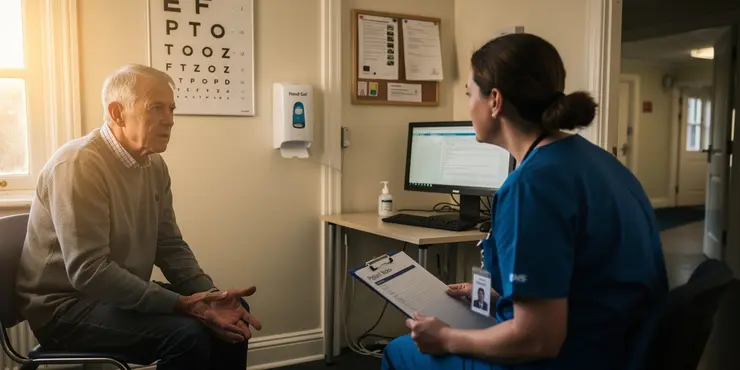
Find Help
More Items From Ergsy search
-

Are there psychological aspects to chronic fatigue syndrome?
Relevance: 100%
-
What is chronic fatigue syndrome?
Relevance: 65%
-

Is chronic fatigue syndrome contagious?
Relevance: 64%
-
Is chronic fatigue syndrome a mental illness?
Relevance: 63%
-

What causes chronic fatigue syndrome?
Relevance: 62%
-
Can children develop chronic fatigue syndrome?
Relevance: 57%
-

Who is at risk of developing chronic fatigue syndrome?
Relevance: 56%
-

How is chronic fatigue syndrome treated?
Relevance: 52%
-

What role do infections play in chronic fatigue syndrome?
Relevance: 51%
-

Is there a cure for chronic fatigue syndrome?
Relevance: 51%
-

Myalgic encephalomyelitis or chronic fatigue syndrome (ME/CFS) | NHS
Relevance: 46%
-

How is chronic fatigue syndrome diagnosed?
Relevance: 44%
-

Can chronic fatigue syndrome be managed with lifestyle changes?
Relevance: 39%
-

How does CFS differ from regular fatigue?
Relevance: 31%
-
What psychological effects can menopause have?
Relevance: 27%
-

Munchausen's syndrome | NHS
Relevance: 26%
-
Are there psychological benefits to having a tan from a sunbed?
Relevance: 25%
-

What is Cushing's syndrome?
Relevance: 24%
-

Can CFS be prevented?
Relevance: 24%
-

Prader-Willi Syndrome | NHS
Relevance: 23%
-

About irritable bowel syndrome (IBS)
Relevance: 23%
-

Are there psychological impacts of menopause that affect cognitive health?
Relevance: 23%
-

What is irritable bowel syndrome (IBS)?
Relevance: 23%
-

What is post-treatment Lyme disease syndrome (PTLDS)?
Relevance: 22%
-

Can fatigue result in dangerous driving?
Relevance: 21%
-

Carpal Tunnel Syndrome
Relevance: 21%
-

Treating irritable bowel syndrome (IBS)
Relevance: 21%
-

Treating irritable bowel syndrome (IBS)
Relevance: 21%
-

Symptoms of irritable bowel syndrome (IBS)
Relevance: 20%
-

Turner syndrome: Beyond the classic XO phenotype
Relevance: 20%
-

What causes Carpal Tunnel Syndrome?
Relevance: 20%
-
Can weight loss medications cause fatigue?
Relevance: 20%
-

What is Carpal Tunnel Syndrome (CTS)?
Relevance: 20%
-

Having a child with Down's syndrome | NHS
Relevance: 20%
-

Causes of irritable bowel syndrome (IBS)
Relevance: 19%
-

Down's syndrome: Emily's story | NHS
Relevance: 19%
-

Chronic kidney disease: What are the treatments?
Relevance: 19%
-

Charles Bonnet Syndrome
Relevance: 19%
-

What is congenital rubella syndrome?
Relevance: 19%
-

Causes of irritable bowel syndrome (IBS)
Relevance: 19%
Introduction
Chronic Fatigue Syndrome (CFS), also known as Myalgic Encephalomyelitis (ME), is a complex and debilitating disorder characterised by extreme fatigue that cannot be explained by any underlying medical condition. This condition affects thousands across the UK, significantly impairing the quality of life. While the physical symptoms of CFS are well-documented, the psychological aspects are equally significant in understanding and managing the condition.
The Role of Psychological Factors in CFS
While CFS is primarily recognized for its physical symptoms, psychological factors often play a crucial role. Stress, anxiety, and depression are common in individuals with CFS, either as contributing factors or as resultant conditions due to the chronic nature of the illness. The profound impact of enduring unexplained physical fatigue can lead to a cycle of negative emotions, potentially exacerbating the condition.
Cognitive Behavioural Therapy (CBT) and CFS
One of the main psychological interventions for CFS is Cognitive Behavioural Therapy (CBT). CBT helps patients understand and alter their patterns of thinking and behavior related to fatigue. Research indicates that CBT can aid in reducing disability and improving fatigue symptoms in some CFS patients. However, it is important to note that CBT is not a cure and is more effective as part of a comprehensive treatment plan tailored to individual needs.
The Impact of Societal Perceptions
Societal and medical scepticism surrounding CFS can contribute to psychological stress. Patients often face stigma due to the invisible nature of their illness, and the lack of definitive diagnostic tests. This can lead to feelings of isolation and frustration, impacting mental health. Support groups and patient advocacy play a critical role in validating experiences and providing necessary emotional support.
Conclusion
Understanding the psychological aspects of Chronic Fatigue Syndrome is essential for comprehensive care. Psychological well-being can influence the course of the illness, and addressing it through therapies such as CBT can be beneficial. Moreover, creating awareness and reducing stigma around CFS can alleviate the psychological burden on patients. Collaboration between healthcare providers, mental health professionals, and patient communities is crucial in managing the multifaceted nature of CFS.
Introduction
Chronic Fatigue Syndrome (CFS), also called Myalgic Encephalomyelitis (ME), is a long-term illness. People with CFS feel very tired all the time. This tiredness does not go away with rest. It is not caused by another illness. Many people in the UK have CFS, and it makes life hard for them. CFS has both body and mind problems. It is important to understand both to help people with CFS.
The Role of Psychological Factors in CFS
CFS causes body problems, but it also affects the mind. People with CFS often feel stressed, worried, or sad. These feelings might make CFS worse. Feeling tired all the time can make people feel bad and upset. This can lead to more problems with their mind and feelings.
Cognitive Behavioural Therapy (CBT) and CFS
Cognitive Behavioural Therapy (CBT) is a talking treatment that helps people with CFS. CBT teaches new ways to think and act about feeling tired. Some studies show it can help people feel less tired and do more things. CBT is not a cure but can be part of a bigger plan to help people with CFS. This plan should be made for each person, as everyone is different.
The Impact of Societal Perceptions
People do not always believe CFS is real because they cannot see it. This can make life hard for people with CFS. They might feel alone or upset because others do not understand. Support groups and talking with others who have CFS can help them feel better and less alone.
Conclusion
To help people with Chronic Fatigue Syndrome, we must think about how it affects their mind. Joining mind and body care can make a big difference. Talking therapies like CBT can help people feel better. Also, teaching others about CFS can help people with CFS feel less alone. Doctors, mind experts, and people with CFS should work together to help everyone with this illness.
Frequently Asked Questions
What is chronic fatigue syndrome?
Chronic fatigue syndrome (CFS) is a complex disorder characterized by extreme fatigue that cannot be explained by any underlying medical condition.
Are there psychological factors involved in chronic fatigue syndrome?
Yes, while CFS is not considered a purely psychological disorder, psychological factors such as stress and emotional well-being can influence the condition and its severity.
How does stress affect chronic fatigue syndrome?
Stress can exacerbate the symptoms of CFS, potentially leading to increased fatigue, difficulty concentrating, and other related symptoms.
Can depression be a part of chronic fatigue syndrome?
Depression and anxiety can co-occur with CFS, although they are distinct conditions. It's important to address both to improve quality of life.
Is cognitive behavioral therapy (CBT) effective for managing CFS?
CBT has been used to help manage the symptoms of CFS by addressing negative thought patterns and behaviors, although results can vary among individuals.
Can psychological interventions improve CFS symptoms?
Some psychological interventions, including CBT and stress management techniques, can help reduce the impact of symptoms and improve coping strategies.
Are personality traits linked to chronic fatigue syndrome?
Certain personality traits, such as high perfectionism or a tendency towards overcommitment, might contribute to the development or exacerbation of CFS.
Does chronic fatigue syndrome affect cognitive function?
Yes, individuals with CFS often experience cognitive difficulties, including problems with memory, attention, and information processing.
How important is sleep for someone with chronic fatigue syndrome?
Quality sleep is crucial for people with CFS, as poor sleep can worsen fatigue and other symptoms associated with the disorder.
How does chronic fatigue syndrome impact mental health?
CFS can significantly impact mental health, leading to or worsening anxiety, depression, and social isolation due to the chronic nature of the condition.
Is there a mind-body connection in chronic fatigue syndrome?
Yes, CFS is influenced by both physical and psychological factors, highlighting the importance of a holistic approach to managing the condition.
Can lifestyle changes help alleviate CFS symptoms?
Lifestyle changes, such as regular gentle exercise, a balanced diet, and stress management techniques, can help manage CFS symptoms effectively.
Does chronic fatigue syndrome require a multidisciplinary treatment approach?
Yes, managing CFS often requires a combination of medical, psychological, and lifestyle interventions tailored to the individual's needs.
What role does anxiety play in chronic fatigue syndrome?
Anxiety can both result from and exacerbate CFS symptoms, making it important to address anxiety through therapeutic interventions.
Is it common for CFS patients to seek psychological counseling?
Yes, many individuals with CFS find psychological counseling beneficial for managing mental health issues and coping with the illness.
How can mindfulness techniques help people with CFS?
Mindfulness techniques can help reduce stress, improve emotional regulation, and increase energy levels, which may aid in managing CFS symptoms.
Do social support networks affect chronic fatigue syndrome outcomes?
Strong social support can play a crucial role in improving the quality of life and psychological well-being of individuals with CFS.
Can chronic fatigue syndrome lead to low self-esteem?
The limitations imposed by CFS can lead to feelings of inadequacy and low self-esteem, highlighting the need for psychological support.
How does chronic fatigue syndrome impact daily activities?
CFS can severely restrict a person's ability to perform daily activities, often requiring adjustments and support to manage day-to-day responsibilities.
Can family therapy be beneficial for someone with CFS?
Family therapy can be beneficial by improving communication, understanding, and support among family members, which can aid in managing CFS.
What is chronic fatigue syndrome?
Chronic fatigue syndrome is a health problem. It makes you feel very tired all the time. You feel tired even if you rest or sleep.
This can make it hard to do daily activities like going to school or playing with friends. It is important to talk to a doctor if you feel this way.
Talking to others, getting help from family and friends, and using a diary to track feelings and tiredness can also help.
Chronic fatigue syndrome (CFS) is a health problem. It makes you feel very tired all the time. Doctors cannot find another health reason for this tiredness.
Do thoughts and feelings play a part in long-term tiredness?
Yes, stress and how we feel can make Chronic Fatigue Syndrome (CFS) better or worse. CFS is not just in our minds, but our feelings and stresses can change how bad it is.
How does stress make chronic fatigue syndrome worse?
Stress can make people with chronic fatigue syndrome feel more tired. Chronic fatigue syndrome is when you feel very tired for a long time, even after resting. Stress is what we feel when we are worried or nervous. When you have stress, it can make you feel more tired and sick.
If you feel stressed, try these things:
- Take deep breaths to calm down.
- Talk to someone you trust about how you feel.
- Do things that make you happy or relaxed, like drawing or listening to music.
Remember, it's okay to ask for help if you need it!
Stress can make Chronic Fatigue Syndrome (CFS) worse. It might make you feel more tired, make it hard to focus, and cause other problems too.
Can feeling very sad be part of always being tired?
Sometimes, people with CFS can also feel very sad or worried. These are different things, but it is important to help with both so you can feel better.
Can CBT help people with CFS feel better?
CBT is a type of talking therapy. It helps people change how they think and act.
CFS stands for Chronic Fatigue Syndrome. It makes people feel very tired all the time.
Some people say CBT helps them manage CFS. It can teach ways to handle tiredness better.
Everyone is different. What helps one person might not help another.
If you have CFS, you can try CBT to see if it helps you.
To remember what you learn, you might find it useful to:
- Write down important points.
- Use simple lists to organize your thoughts.
- Talk to a friend or family member about what you learn.
Always talk to your doctor before trying new treatments.
CBT is a way to help people with CFS feel better. It works by changing bad thoughts and actions. It doesn't work the same for everyone, but it can help some people.
Here are some tools and tips that might help:
- Try using picture stories to understand things better.
- Write down your thoughts in a simple diary every day.
- Talk to someone you trust about how you feel.
- Practice calming exercises, like deep breathing.
Can talking and thinking help people with CFS feel better?
People with CFS (Chronic Fatigue Syndrome) often feel very tired and unwell. Talking to a professional, like a doctor or therapist, can sometimes help. They use special ways to help people feel better. This can include talking about feelings and thinking in new ways.
Some ways to feel better when things are hard include talking to someone who can help, like a counselor. They might use something called CBT. There are also ways to manage stress that can make you feel better and help you deal with problems.
Do personality traits cause tiredness that does not go away?
Some people are tired all the time. This is called chronic fatigue syndrome.
The way we act or feel is called personality traits.
Scientists want to know if how we act or feel can make us always tired.
If you have trouble reading, you can:
- Ask someone to read with you.
- Use a reading app to read the words out loud.
- Take breaks to understand the words better.
Some people might get CFS if they always want to do everything perfectly or if they take on too much work. These personality traits can make CFS start or get worse.
Does chronic fatigue syndrome make it hard to think clearly?
Chronic fatigue syndrome (CFS) can make people feel very tired. It can also make it hard for them to think or concentrate. This is sometimes called "brain fog."
If you have CFS and find it hard to think, here are some things that can help:
- Take breaks when you need to rest.
- Try to do one thing at a time.
- Write things down to help you remember.
- Use alarms or reminders.
If you feel very tired or have problems thinking, talk to a doctor or nurse. They can help you find more ways to feel better.
Yes, people with CFS can have trouble with thinking. They might forget things, find it hard to pay attention, or take longer to understand information.
Why is sleep important for people with chronic fatigue syndrome?
Sleep is very important for people with chronic fatigue syndrome. This is because their bodies get tired easily. Good sleep helps them feel a little better during the day.
If you have trouble sleeping, try some things that might help, like:
- Go to bed at the same time every night.
- Make your bedroom quiet and dark.
- Avoid screens like phones or tablets before sleeping.
If you find it hard to sleep, ask a doctor for help. They can give you advice to rest better.
Good sleep is very important for people with CFS. Bad sleep can make you feel more tired and make other symptoms worse.
How does long-term tiredness affect how we feel?
Sometimes, people feel very tired for a long time. This is called long-term tiredness.
This can make people feel sad, worried, or stressed. It can be hard to do things you love.
For support, try to talk to a friend or a trusted adult.
You can also write about how you feel or draw pictures. This might help you feel better.
CFS can make people feel very tired for a long time. This can also make people feel worried, sad, or alone. It is important to talk to someone who can help, like a doctor or a friend. Try doing things that can make you feel better, like taking breaks or joining a support group.
Does the mind affect the body in chronic fatigue syndrome?
People with chronic fatigue syndrome feel tired all the time. This feeling doesn't go away with rest. Doctors think how we feel and think can affect this tiredness. They call this the mind-body connection.
Tools like talking to someone about your feelings or practicing calm breathing can help manage this tiredness.
Yes, CFS is caused by both the body and the mind. It is important to look at the whole person when helping them manage CFS.
Can changing daily habits help CFS symptoms feel better?
To feel better when you have CFS, try making some changes. Do some easy exercises regularly, eat healthy foods, and find ways to relax and handle stress.
Do you need different types of help to treat chronic fatigue syndrome?
Here is a simple explanation of the question:
- Chronic fatigue syndrome: This is a health problem that makes people feel very tired all the time.
- Different types of help: This means getting help from many kinds of doctors and specialists, like doctors for your body, mind, and exercise.
Some tools or techniques that might help:
- Talk to a doctor: They can explain things in a way that's easy to understand.
- Use pictures or charts: Seeing information in pictures can make it easier to understand.
- Ask questions: It's okay to ask lots of questions to make sure you understand.
This means asking if people with chronic fatigue syndrome need help from different kinds of doctors and specialists to feel better.
Yes, taking care of CFS needs different types of help. You might need medicine, talking therapy, and changing how you live day to day. It all depends on what each person needs.
How does feeling anxious affect people with chronic tiredness?
Anxiety can make Chronic Fatigue Syndrome (CFS) symptoms worse. It is important to manage anxiety with therapy to help feel better.
Do people with CFS often talk to a therapist?
Yes, talking to a counselor can help people with CFS feel better. It helps them deal with feelings and handle being sick.
How can calm thinking help people with CFS?
Calm thinking means being quiet and focused. It helps you feel better in your body and mind.
People with CFS (Chronic Fatigue Syndrome) feel very tired. Calm thinking can help them relax and feel happier.
Some ways to do calm thinking:
- Take slow, deep breaths.
- Think of a nice place.
- Listen to calming music.
Try calm thinking every day. It may help you feel a bit better. You can also ask for help from a teacher or a family member if you need it.
Mindfulness can help you feel less stressed. It can help you manage your feelings better. It can also give you more energy. This might help you if you have CFS.
Do friends and family help people with long-term tiredness feel better?
People with long-term tiredness might feel better when they have help from friends and family.
What can help?
- Talking to a friend.
- Having a family member visit.
- Being part of a support group.
These things can make people feel happier and less tired.
Having good friends and family around you can really help if you have CFS. It can make you feel better and happier.
Can long-term tiredness make you feel bad about yourself?
When you have CFS, you might feel like you can't do things as well as you want to. This can make you feel bad about yourself. It's important to get help from someone who can support you and make you feel better.
How does chronic fatigue syndrome affect daily activities?
Chronic fatigue syndrome can make people feel very tired. This tired feeling does not go away with rest. It can make it hard to do everyday things like:
- Getting out of bed
- Going to school or work
- Playing with friends
- Doing chores
- Having fun
People with this sickness might need more rest. They may try gentle exercises like stretching.
Listening to their body and taking breaks can help. They might also talk to a doctor or a therapist to find ways to feel better.
CFS can make it very hard for someone to do everyday things. They might need help and make changes to get through daily tasks.
Can family therapy help someone with CFS feel better?
CFS means Chronic Fatigue Syndrome, which makes people very tired and weak. Sometimes, talking with family and a therapist can help.
How can family therapy help?
- Family therapy is when families talk to a special helper called a therapist.
- The therapist helps everyone understand how CFS affects their loved one.
- This can help the family learn new ways to support and help each other.
Here are some tools that can help:
- Use drawings or pictures to show feelings.
- Writing down feelings can make it easier to talk about them.
- Practice talking about one thing at a time.
Family therapy can help everyone work together to make things better.
Family therapy can help families talk better, understand each other, and support each other more. This can help manage CFS.
Useful Links
This website offers general information and is not a substitute for professional advice.
Always seek guidance from qualified professionals.
If you have any medical concerns or need urgent help, contact a healthcare professional or emergency services immediately.
Some of this content was generated with AI assistance. We’ve done our best to keep it accurate, helpful, and human-friendly.
- Ergsy carfully checks the information in the videos we provide here.
- Videos shown by Youtube after a video has completed, have NOT been reviewed by ERGSY.
- To view, click the arrow in centre of video.
- Most of the videos you find here will have subtitles and/or closed captions available.
- You may need to turn these on, and choose your preferred language.
- Go to the video you'd like to watch.
- If closed captions (CC) are available, settings will be visible on the bottom right of the video player.
- To turn on Captions, click settings .
- To turn off Captions, click settings again.
More Items From Ergsy search
-

Are there psychological aspects to chronic fatigue syndrome?
Relevance: 100%
-
What is chronic fatigue syndrome?
Relevance: 65%
-

Is chronic fatigue syndrome contagious?
Relevance: 64%
-
Is chronic fatigue syndrome a mental illness?
Relevance: 63%
-

What causes chronic fatigue syndrome?
Relevance: 62%
-
Can children develop chronic fatigue syndrome?
Relevance: 57%
-

Who is at risk of developing chronic fatigue syndrome?
Relevance: 56%
-

How is chronic fatigue syndrome treated?
Relevance: 52%
-

What role do infections play in chronic fatigue syndrome?
Relevance: 51%
-

Is there a cure for chronic fatigue syndrome?
Relevance: 51%
-

Myalgic encephalomyelitis or chronic fatigue syndrome (ME/CFS) | NHS
Relevance: 46%
-

How is chronic fatigue syndrome diagnosed?
Relevance: 44%
-

Can chronic fatigue syndrome be managed with lifestyle changes?
Relevance: 39%
-

How does CFS differ from regular fatigue?
Relevance: 31%
-
What psychological effects can menopause have?
Relevance: 27%
-

Munchausen's syndrome | NHS
Relevance: 26%
-
Are there psychological benefits to having a tan from a sunbed?
Relevance: 25%
-

What is Cushing's syndrome?
Relevance: 24%
-

Can CFS be prevented?
Relevance: 24%
-

Prader-Willi Syndrome | NHS
Relevance: 23%
-

About irritable bowel syndrome (IBS)
Relevance: 23%
-

Are there psychological impacts of menopause that affect cognitive health?
Relevance: 23%
-

What is irritable bowel syndrome (IBS)?
Relevance: 23%
-

What is post-treatment Lyme disease syndrome (PTLDS)?
Relevance: 22%
-

Can fatigue result in dangerous driving?
Relevance: 21%
-

Carpal Tunnel Syndrome
Relevance: 21%
-

Treating irritable bowel syndrome (IBS)
Relevance: 21%
-

Treating irritable bowel syndrome (IBS)
Relevance: 21%
-

Symptoms of irritable bowel syndrome (IBS)
Relevance: 20%
-

Turner syndrome: Beyond the classic XO phenotype
Relevance: 20%
-

What causes Carpal Tunnel Syndrome?
Relevance: 20%
-
Can weight loss medications cause fatigue?
Relevance: 20%
-

What is Carpal Tunnel Syndrome (CTS)?
Relevance: 20%
-

Having a child with Down's syndrome | NHS
Relevance: 20%
-

Causes of irritable bowel syndrome (IBS)
Relevance: 19%
-

Down's syndrome: Emily's story | NHS
Relevance: 19%
-

Chronic kidney disease: What are the treatments?
Relevance: 19%
-

Charles Bonnet Syndrome
Relevance: 19%
-

What is congenital rubella syndrome?
Relevance: 19%
-

Causes of irritable bowel syndrome (IBS)
Relevance: 19%


